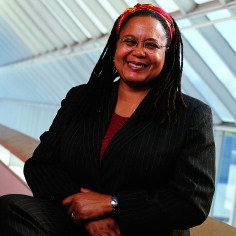 |
| Evelynn M. Hammonds |
| Photograph by Stu Rosner |
She grew up in Atlanta, got dual undergraduate degrees from Spelman College in physics and Georgia Tech in electrical engineering, earned a master's degree in physics from MIT, and then in 1980 began a five-year sojourn as a software engineer in the corporate world. She didn't like it. Evelynn Hammonds was setting up computer systems in offices and explaining to secretaries and executives that they had to give up their old ways, and she wanted to think large thoughts about what the effect of this new technology on their lives would be. But no one was paying her to think such thoughts. She decided to return to the academic world. A friend advised her to study the history of science, and she entered the doctoral program at Harvard. "After one semester, I knew this was for me," says Hammonds, who got her Ph.D. in 1993 and went back to MIT to teach. Last May she accepted Harvard's offer of a joint appointment as professor of the history of science and of Afro-American studies, becoming the fourth black woman tenured within the Faculty of Arts and Sciences. Her fieldand the topic of a course she hopes to offer this springis the history of the ways in which science has examined questions about human variation through the concept of race in the United States, from the seventeenth century to the present. She believes that few other Afro-Am scholars are studying the impact of science on the experience of blacks. She is at work on a book in which she quotes the late economist and sociologist Gunnar Myrdal, who declared as long ago as 1944 that "the concept of the American Negro is a social concept, not a biological one." Yet in medicine, public health, anatomy, physical anthropology, and biology, she finds, "the end of 'race' is not as close as some observers might have us believe."





